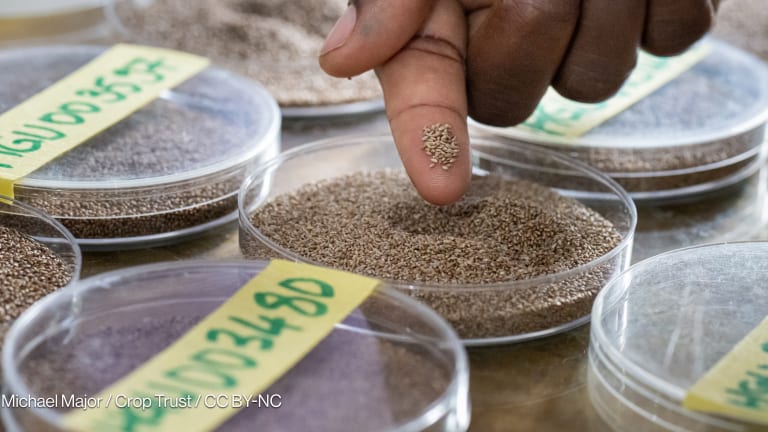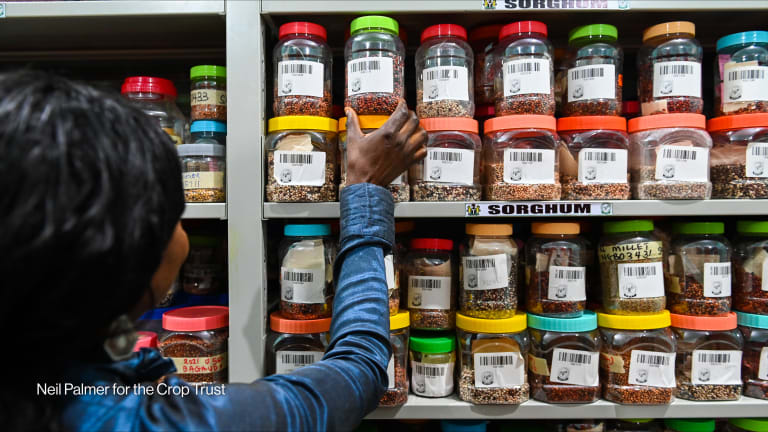
CANBERRA — The global food system needs to be transformed to respond to the health and nutrition needs of the future. To achieve this, however, there needs to be a strong global program to prevent greater threats from climate change.
In Canberra on Nov. 30, leaders of three CGIAR centers gathered to talk about global food systems as part of a forum on transforming global food systems hosted by the Australian Centre for International Agricultural Research. The message on climate was consistent: Food security is critical to the achievement of the Sustainable Development Goals. But climate change is creating a risk that is growing rapidly.
“One of the biggest issues in the use of averages is that it hides the real story of climate change. The real story is around the variability and unpredictability of weather.”
— Matthew Morell, director general, International Rice Research InstituteMartin Kropff, director general of the International Maize and Wheat Improvement Center, and Matthew Morell, director general of the International Rice Research Institute, spent their time visiting Australian research institutes and presenting at a range of forums. As part of their visit, they spoke to Devex about the limits of agricultural research, and why we may be fast hitting barriers of how science can solve food crises in a fast-changing environment.
“Whether it is rice, maize, and livestock, we are looking at similar questions: the livelihood of smallholder farmers, nutrition, empowerment of women, and impact of climate change,” Morell said. “We need to do this to come up with an overall comprehensive solution to solve some of these challenges.”
Food security requires climate action
“In 1993, I was a scientist at IRRI and our crop models [were] incorporating early climate change projections,” Kropff said. “We made a prediction based on the available models and in those days we wanted to be careful and not alarmist. And I was skeptical. But 25 years later what the models projected is happening. These predictions are real — and I am convinced we have to get out act together. It is not going to be simple.”
Though the impact of climate change on the environment and food security has been known for decades, the response has been limited.
“We have individuals in the world — it is pretty clear who they are — that really want to put their head in the sand about this issue,” Morell said. “They will say that if it’s cold, that is proof that global warming doesn’t really exist. But there are also those who point to averages.
“One of the biggest issues in the use of averages is that it hides the real story of climate change. The real story is around the variability and unpredictability of weather. What I see on the ground is that a monsoon is delayed. I see that there is rain in the dry season when farmers really need it to be dry because they have planted crops that can’t cope with excess water,” Morell said.
Among the solutions are to build in biological insurances within plants, giving them the ability to withstand these stresses — whichever way the production season turns out. There is also crop insurance for smallholder farmers so they have the confidence to invest in inputs, maximizing their potential income without fear of being financially destroyed because of the weather.
But it is crucial, both Morell and Kropff said, that such solutions are coupled with action to prevent global warming to levels currently being forecast.
Responses remain reactive rather than proactive
“I’m afraid on food security I would place us as globally complacent,” Morell said.
Scientific modeling, Morell said, shows that drought, new diseases, and extreme weather events such as cyclones or typhoons will happen — even if it is impossible to pinpoint place or time.
“But if we are rational human beings, we understand that we should invest to future-proof our food systems to deal better with these eventualities,” Morell said. “Yet our political systems and current thinking is responsive — and by then it is less cost-effective and simply less effective in general to deliver food aid rather than build a more resilient system in the first place.”
The actions of governments today are still as responsive as the past. And this means that funding for research is just not adequate.
“In 2008 we had the price of major staples increase and there was an injection of funding because of that,” Morell said. “But now we have slipped back into our old ways. What appalls me is that we still have 800 million people who go to be hungry every night. We still have 151 million children suffering from stunting and hundreds of millions of people suffering from iron and nutrition deficiencies. This is right in front of us every day and it’s a global disgrace that we haven’t eliminated that.
“Around the world, there has been a trend, and the populist movement is less generous. And this means the prevention of issues down the track — and the research funding needed — are being overlooked.”
Limits of what science can achieve
“We continually have new diseases coming in,” Kropff said. Since taking on the role of director general in 2015, he has seen more than one new disease a year that has dramatically impacted crops — including a new disease in Africa that is growing fast across the continent, wiping out maize. It is one of the effects of changing environmental conditions.
In 2011 an emerging disease wiped out 20 percent of maize crop in Kenya, and it took four years to produce a resistant variety.
“Four years is too long,” Kropff said. “But 10 years ago it would have been 14. We are fast, but not fast enough. We need to deal better with predicting new diseases and have technology that is faster.”
The concern for Kropff is that with the rate of emerging diseases, there may be a time when they cannot be fast enough.
“When you start innovating, at the beginning it is easy. But there starts to get to a stage where it requires a lot more science to go to the next stage,” he said. “It’s bigger than people think.”
Reducing the impact of climate change is the better solution.
Working together for collective action
Responding to the issue of climate change in food security requires global action. Among the 15 CGIAR centers — including the International Maize and Wheat Improvement Center and International Rice Research Institute — there is collective action with it impacting all aspects of their work.
“It’s so important to work globally together,” Kopf said. “I’m still convinced we can do something about this. The Sustainable Development Goals are the same for all of us and there is a lot of ideas and things we do. And we have programs that go across the centers with our scientists working together. And we need to continue doing this to influence research, funding, and global policies.”








